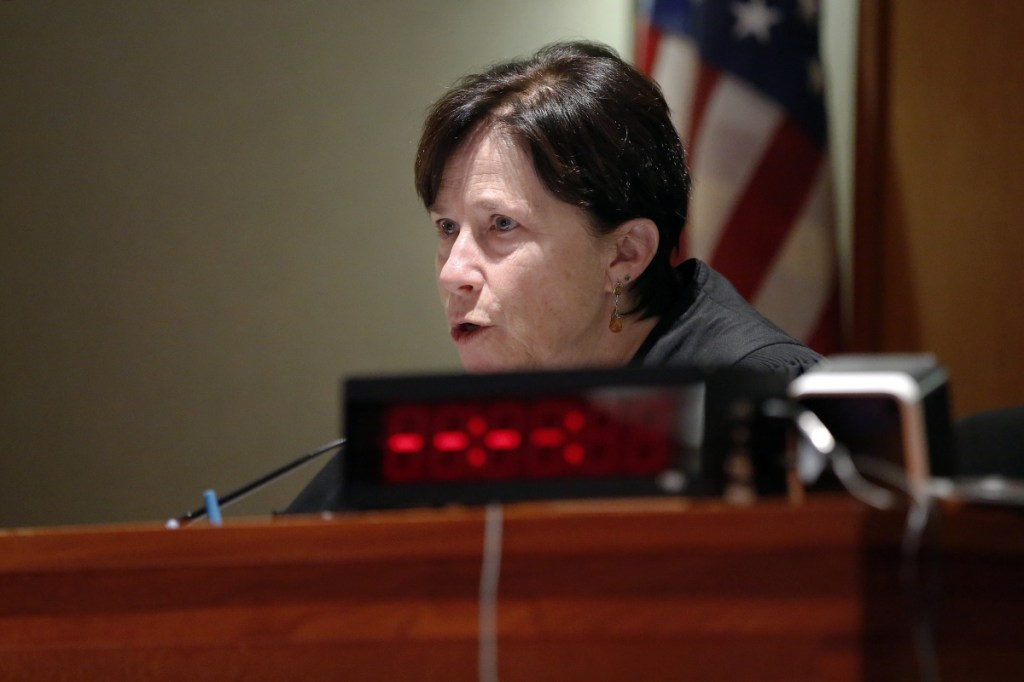PORTLAND — A judge took little time Friday in denying a new trial and an acquittal to David Marble Jr., convicted of two counts of murder in the drug-related shooting deaths of an Augusta couple early on Dec. 25, 2015.
A jury in Cumberland County Superior Court convicted Marble, 32, of Rochester, New York, on July 18.
Sentencing originally had been scheduled for Friday; however, Marble’s defense attorneys filed a motion for a new trial, and the judge decided to hear oral arguments on those issues.
The state objected to all the defense motions.
Justice Michaela Murphy, who presided at trial, already had ruled on a number of those motions both before and at the trial.
Two dozen family members of the slain couple, Eric Williams, 35, and Bonnie Royer, 26, watched the hearing. Many of them have been present in court for every step in the case.
On Friday, Marble walked into the courtroom in an orange jail uniform, his hands free and ankles shackled. He sat at a table between his attorneys, Jon Gale and Neale Duffett. The entire hearing — including a 20-minute break for the judge to consider the oral arguments and read a case cited by the defense, was less than hour. Marble showed little reaction in court.
Marble was escorted out, and shortly afterward attorneys said a sentencing hearing will be held at 10 a.m. Nov. 9.
Both Gale and Duffett said they had no comment after the hearing.
Royer’s mother, Christine Collins, who lives in the Gray area, stood in the courthouse hallway, putting the sentencing time and date into her phone. She said she “very pleased” with the judge’s ruling Friday.
“I just want it to be over and done with,” Collins said.
In arguing for the new trial, Duffett reiterated the defense position that a faulty search warrant was used to gain cellphone site location information data about Marble’s cellphone. The information obtained was used at trial. Jurors were told that the cellphone had been tracked from Marble’s apartment in Augusta to the site of the killings in a rural section of Manchester and then back to Marble’s residence.
Deputy Attorney General Lisa Marchese pointed out that investigators knew Marble had used his cellphone to contact Williams at 2:14 a.m., an hour and 15 minutes before a 911 call from Royer saying she and Williams had been shot.
“They also had the added information that David Marble bought two handguns, and (investigators) knew that the victims were shot,” Marchese said on Friday. “They had the added information there was a relationship between David Marble and Eric Williams.”
Murphy ruled that while the search warrant application contained “ambiguous language,” there was ample probable cause to get the phone location. She also concluded that the jury was instructed properly on accomplice liability because the defense had suggested someone other than Marble had committed the crime.
Defense attorneys maintained that the nonprofessional witnesses who testified at the trial — all of whom received immunity from prosecution for their actions — were unreliable. In particular, they cited testimony by Timothy Bragg, who said he had bought two firearms for Marble, had driven Marble back from the area where the bodies were found, and had watched Marble throw away the gun used in the shootings near the railroad trestle in Augusta.
The attorneys wrote that Bragg “was given complete transactional immunity by the state for all possible crimes, including murder,” that he had a prior theft conviction and that no gun was found near the trestle.
The state responded in the written opposition, saying, “These are the people the defendant chose to interact with, employ and exploit. The defendant chose them, not the state. Their foibles, crimes and addiction were disclosed to the jury, and the jury made its determination knowing all that.”
Murphy ruled that the defense took the opportunity to question those witnesses as well as numerous investigators in front of the jury.
“The credibility of witnesses is really solely the province of the jury,” she concluded.
She also noted she had not been involved previously in a trial either as a judge or attorney “where there were so many immunized witnesses.”
Prosecutors said Marble wanted revenge after his apartment had been burglarized earlier on Dec. 25, 2015, while he was being driven to southern Maine get more drugs. Williams and several others — not including Royer — stole a firearm, televisions and drugs in that burglary.
The prosecutors also said that while Williams worked for Marble, the drug dealer, their relationship “was strained because Eric Williams collected money for the defendant and a couple of days prior to the homicide, he didn’t return with the money he was supposed to collect. …”
Marchese, in closing arguments, told jurors that Marble was in the rear seat of Williams’ Chevrolet Trailblazer when he shot Williams and Royer in the back of the head. He then got into the back seat of Bragg’s vehicle and was driven off briefly before telling Bragg he thought he had dropped his cellphone. When he returned for the phone, he shot Royer again, Marchese said. Royer was found with Williams’ cellphone in her lap.
While the slayings occurred in Kennebec County, the judge in April 2017 granted a defense motion to move it elsewhere because of extensive pretrial publicity, some of it centered around Gov. Paul LePage’s reference in January 2016 to “Dee Money” at a town-hall-style meeting. LePage, in speaking about the opioid epidemic, said people with names like “Dee Money, Smoothie, Shifty— these types of guys — they come from Connecticut and New York, they come up here, they sell their heroin, they go back home. Incidentally, half the time they impregnate a young white girl before they leave, which is a real sad thing because then we have another issue we have to deal with down the road.” LePage later apologized to Maine women.
The judge ordered Marble’s alias, “Dee Money,” removed from Marble’s indictment in March 2016.
Betty Adams — 621-5631
Twitter: @betadams
Comments are not available on this story.
Send questions/comments to the editors.






